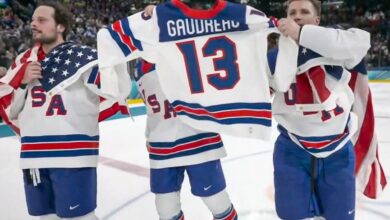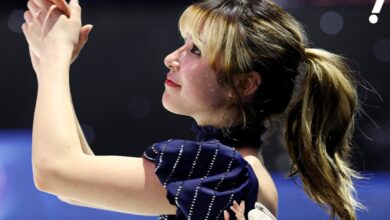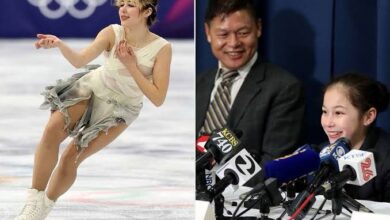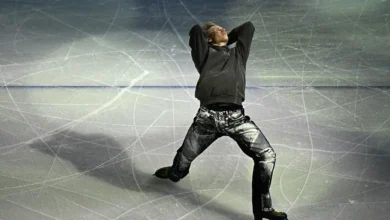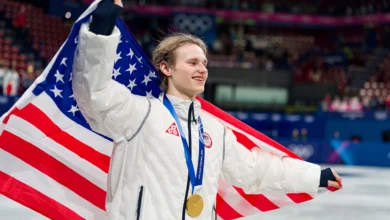Ann Wilson Proves Why “Magic Man” Still Defines Rock Greatness in 2025
The August 15, 2025 performance took place at The Show at Agua Caliente Resort Casino Spa in Rancho Mirage, California—a date that was listed by the venue and ticketing outlets well in advance and ultimately marked “sold out.” Slated for an 8:00 p.m. start, it drew fans for a focused, career-spanning set in a compact theater rather than an arena, a deliberate choice that framed the night as an intimate showcase for Heart’s classic material, including “Magic Man.”
This stop was billed as an “An Evening With Heart” performance, meaning no opening act and a single extended set designed to flow without the start-and-stop pacing of multi-band bills. That format suits The Show’s auditorium-style room, where the farthest seat sits close enough for details to register. The venue’s clear sightlines and modern sound reinforcement favored nuance—useful on a program mixing heavy rockers, acoustic storytelling, and symphonic-leaning ballads.
The Rancho Mirage date carried added weight given the path back to the stage. After Ann Wilson’s 2024 cancer diagnosis forced postponements, the band re-aligned its calendar into 2025. By mid-2025, Wilson had finished treatment and publicly emphasized that the “worst is over,” a context that turned each night into both a concert and a quiet celebration of regained momentum. The tone in Rancho Mirage reflected that—determined, grateful, and unhurried.
Onstage, Heart’s core was the Wilson sisters—Ann on commanding lead vocals and Nancy on guitars and vocals—supported by the group’s current live lineup: guitarists Ryan Waters and Ryan Wariner, multi-instrumentalist Paul Moak, bassist Tony Lucido, and drummer Sean T. Lane. The ensemble has coalesced over recent years into a flexible unit, equally comfortable with ‘70s hard-rock textures and the polished dynamics of the band’s ‘80s hits.
The setlist followed the tour’s “An Evening With Heart” arc and balanced eras. Early album cuts and radio staples were interwoven rather than stacked, keeping the room engaged through contrasts—crunch into quiet, acoustic into electric, memory into surprise. “Magic Man” landed mid-set as a keystone rather than an encore tease, framed by both reflective pieces and muscular rockers, which sharpened its impact when those opening chords finally arrived.
“Magic Man” itself was presented with the authority of a signature. In 1976 it became Heart’s first U.S. Top 10 single, and the song’s structure—sensual verse, ominous climb, and that long, moody instrumental break—remains a natural canvas for drama. Live, the arrangement held to the spirit of the original: a simmer that tips into release, guitars and keys carving space for Ann’s vocal to ride above the band’s low, insistent engine.
Nancy’s guitar work and the twin-guitar team supported the tune’s hypnotic mid-section, allowing the keyboard textures to color the harmony the way the studio version’s Minimoog once did. The rhythm section kept the performance glued together with a slightly sturdier live pulse than the single edit ever had. The result was less a nostalgia turn than a reminder of how modern the track still feels in a theater built for clarity.
Audience energy built in waves around “Magic Man.” The venue’s acoustics favored Ann’s sustained lines, and the front-of-house mix left room for consonants to cut without harshness—important on a lyric that moves from seduction to a mother’s admonitions. The crowd leaned into the chorus as a communal release: recognition first, then participation, then the kind of hush that only arrives when a room trusts a band to take its time.
The night’s design also showcased Heart’s long affinity for Led Zeppelin. Acoustic-forward Zeppelin material—particularly “Going to California” and the orchestral breadth of “The Rain Song”—sat comfortably alongside Heart originals and reflected the band’s lifelong study of dynamics and light-and-shade. In Rancho Mirage, those pieces played as palate cleansers and tributes, deepening the emotional register before heavier bookends returned.
Elsewhere, the set gave space to the introspection and storytelling of “Dog & Butterfly,” delivered with the intimacy that small theaters reward. On the other end of the spectrum, the ‘80s comeback singles—“Never,” “Alone,” and “What About Love”—arrived with the kind of precision that highlights Ann’s control and Nancy’s harmonic support. The contrast strengthened “Magic Man,” placing it in lineage rather than isolation.
The show’s climactic run leaned into the expected thunder—“Crazy on You” earlier in the evening and a late-set charge through “Barracuda.” Even then, the pacing kept excess in check: punchy tempos, tight segues, and a focus on song rather than extended solos for their own sake. That discipline left “Magic Man” as the performance most free to unspool and breathe—an intentional center of gravity.
Part of what made this date distinctive was the setting. The Show is a 2,000-plus-seat house whose design avoids dead corners and long throws, so crescendos don’t smear and quiet passages don’t vanish. For Heart, a band that toggles between acoustic delicacy and electric weight, that environment can make the difference between merely hearing arrangements and actually feeling the architecture of a song like “Magic Man.”
Operationally, the evening reflected a well-run theater show: an on-time curtain, minimal changeover, and a house measured in dozens of rows rather than football-field distances. The resort setting meant dedicated entryways and on-site parking, with guests moving from casino floors and lobby bars into the room before the lights dropped. It’s not an arena spectacle; it’s a focused musical appointment with a clear sightline.
Tour context helped explain the repertoire and tone. Heart’s 2025 routing combined arenas, amphitheaters, and selected theaters, with certain dates marked as “An Evening With Heart” while others featured special guests. Rancho Mirage fell in that first category, which often results in longer Heart sets and deeper catalog turns. For fans following multiple stops, the mid-August theater hits carried a slightly different, more curated energy.
“Magic Man,” placed as it was, acted like a thesis for the night: the Wilsons’ songwriting voice, the band’s dynamic control, and the audience’s lived memory converged in one performance. The studio cut’s sensual ambiguity matured into a live meditation about agency and allure, told by artists who have carried it for nearly five decades and can still find fresh angles inside its familiar contours.
By the time the final encores landed and the houselights rose, the Rancho Mirage crowd had been given the full diagonal of Heart’s catalog: acoustic confessionals, orchestral-minded epics, gilded ‘80s hits, and the teeth of the early hard-rock era. In that broader portrait, “Magic Man” wasn’t just a nostalgic sing-along; it was the hinge that let the whole night swing between past and present with purpose.
In a year defined by comeback and continuity, the Agua Caliente performance underlined why certain songs endure. “Magic Man” survived the passage from FM radio to streaming playlists, from stadiums to theaters, because it’s built on tension, release, and human-scale storytelling—elements that flourish in a room like The Show and in the hands of a band that understands restraint as well as roar.
